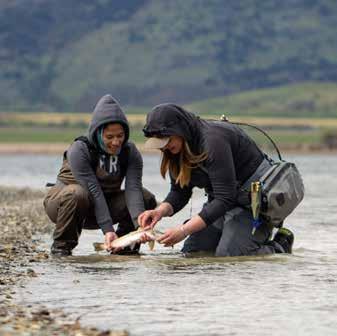
7 minute read
Frontline / Professional trout
Born to Fish
For Australian-cum-Kiwi Kristina Placko, being a professional trout fishing guide is as much about the fulfilment she gets from the spectacular places it takes her, the amazing people she meets, and educating others, as it is about the fishing itself.
Advertisement
WORDS Annie Studholme
KRISTINA PLACKO STRUGGLES TO REMEMBER A
time in her life without fishing. It’s something she has always done, having been introduced to it by her father at a young age, catching fish in the breakwaters around the outer suburbs of her hometown of Melbourne. ‘Because I liked it, I kept learning about it. I started gravitating towards other people that fished,’ she explains.
She started trout fishing in the unique Victorian streams, and then moved further afield to the breathtaking Victorian and New South Wales high country plains and Rocky Valley rivers, to all over Australia, both salt and freshwater. She has also fished in British Columbia and parts of Eastern Europe.
Kristina first visited the South Island on a pre-planned fishing trip about 10 years ago. In the following years she returned multiple times to explore new waters, blown away by the sheer amount of trout-holding water and fly fishing opportunities. ‘It just became too hard to leave, so I decided to move here permanently in 2015, settling in Central Otago,’ she says.
Kristina spent the next three years honing her skills on the blue-ribbon rivers of the Mackenzie Country, Central Otago, Southland and Fiordland. While her angling skills were transferable, she found local knowledge wasn’t. Since moving to Canterbury two years ago, she’s been trying to come to terms with Canterbury’s unique braided rivers. ‘New Zealand is a dynamic place to fish in. No two days are ever the same. It’s always a challenge. I had to put a lot of time into learning the rivers. If you respect the environment and the fish enough, you have to learn about it.’
Kristina says the old saying that ‘10 per cent of the fishermen catch 90 per cent of the fish’ certainly rings true when it comes to trout. ‘Fly fishing is hard. There is no such thing as luck.’
Becoming a fishing guide wasn’t something Kristina had thought about until she moved to New Zealand. ‘It was only after moving here and fishing with other guides and after voluntarily fishing with many visitors to New Zealand, that it grew organically. I found I had much more information and experience to share than I initially thought.’
Two years ago she took the plunge and set up Stray South Fishing Outfitters, offering guided trips to some of the South Island’s most pristine trout fishing waters. She is a registered guide with the New Zealand Professional Fishing Guides Association. There is an unwritten code amongst guides. It’s a tight-knit group, each sticking to their favoured regions.
Though you don’t have to be licensed to be a fly fishing guide, registered guides are trained in CPR and First Aid, have insurance, pay concessions to the Department of Conservation (DOC), and are Work Safe approved. As a guide, Kristina is as vigilant as ever and aware of their surroundings when negotiating quick changes in weather patterns, and at times, fast-moving rivers. ‘You are paying a

LEFT Fly fishing takes Kristina to some spectacular places throughout the Mackenzie Country, Central Otago and Southland.
OPPOSITE There’s no doubt Kristina loves guiding as much as she does fishing.
registered guide to know you are safe,’ she says.
Kristina offers guided fly fishing trips, and is also one of the few South Island guides to offer guided spin fishing trips. More popular in Australia, spin fishing is just another avenue to catch a fish. It’s a more targeted method, and is technically easier than fly fishing.
For fishing tourists, especially those where time is of the essence, guides can be worth their weight in gold. ‘It’s definitely more time efficient,’ says Kristina. ‘We are on the ground. We know what’s happened over the past 12 months, whether there has been a flood [which affects food supply] or if the water quality has changed.’
There are many things that happen before, during and after a trip that clients don’t see. ‘Any guide will be constantly mapping the wind conditions and the weather. They’ll also have a watchful eye on the barometer, water flow and water quality. Success revolves around the food source. Fly entomology is just as important. You need to understand the food source, that’s what separates a good angler from a mediocre one. If there’s no food, there’s no fish.’ She says the goal is to mimic the food source.
While she aims to put her clients on a fish every day, Kristina says she can’t work miracles. She can’t make them bite or be big, and she can’t hook them for her clients. Being a guide is not always as glamorous as it seems; days can be long and frustrating. She feels the sting of a hard day for her clients. ‘I always make sure I pack an amazing lunch, because you can’t control the fish. Sometimes you have to walk away empty-handed.’
The key is knowing your clients and meeting their expectations, says Kristina. ‘We need to be able to adapt very quickly. A good guide can read the situation and make the best of it. Sometimes you just have to fly by the seat of your pants!’
Fishing is a great leveller. It doesn’t matter how much money you have or haven’t got, fish don’t discriminate, she says. ‘When you are catching fish, you’re a nobody. It’s such a humbling experience.’ But when they do land a trout, people’s smiles say it all. ‘It doesn’t matter whether it’s their first fish or their last, or something off their bucket list, it gets me every time. I am a fairly excitable person, but I get such a buzz out of seeing other people catch a fish.’
It’s not just about the fishing though. It’s about rekindling people’s sense of wonder and sparking an awareness of the beauty of nature’s surroundings. ‘As anglers we are custodians of our waterways. Fishing is about education, and encouraging an appreciation of the environment. Even if people can take one other thing from the day, it’s those lessons that are invaluable.’

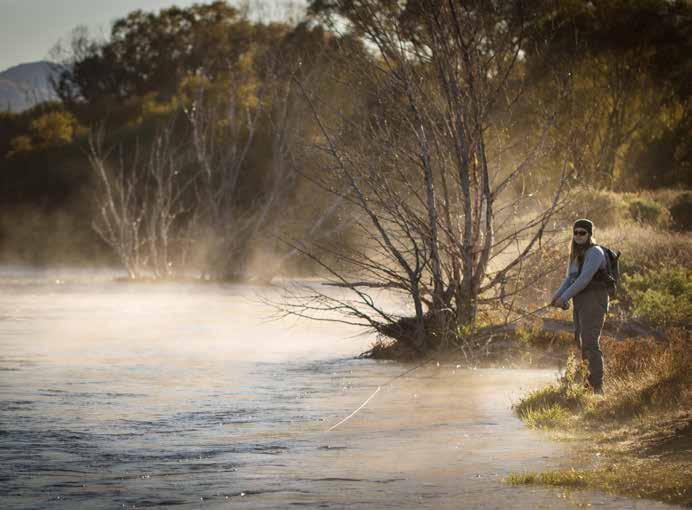
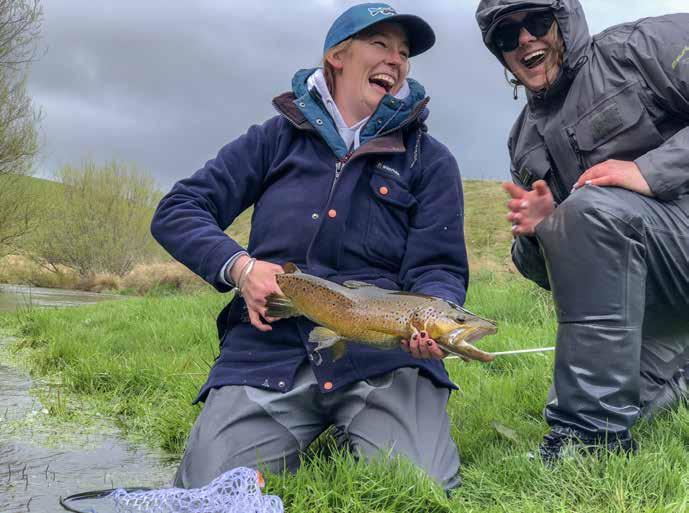
For Kristina, it’s also about the people. ‘I am a real peopleperson. I love meeting all the different people and sharing my knowledge with them, from clients to other guides I work with. I believe fishing is for everyone, regardless of age, experience or gender. Sometimes I think I love guiding more than fishing.’
While she is in the minority as a female guide, Kristina doesn’t let it bother her. ‘I am a fisherman,’ she smiles. ‘A guide is a guide. But as a female fisherman, I think maybe I bring a different perspective and a little bit more sensitivity. I can be just as hard as the rest of them though. I just have a different approach.’
Kristina’s ‘day job’ is as a project manager for the construction industry, so she is well used to the ‘boys club’. Thankfully, when you’re out on the river, the fish don’t know the difference!
With fishing tourists, luxury or otherwise, not biting so much this season due to COVID-19 restrictions, she says there’s more casting room on rivers for New Zealanders this season than ever before. While it was tough for guides who relied on the international market, on a positive note it was giving our waterways a chance to recover from an influx of anglers eager to get their hands on a prized trout.
In some areas the fishing seasons had been extended so more people can take advantage. For brown trout the season typically opens on 1 October and runs through to 30 April, whereas rainbow trout is from 1 November to 30 May. It is best to check out the Fish & Game website before you head out.
Kristina shares her love for fishing through regularly volunteering for Casting for Recovery, which offers fly fishing retreats up and down the country for women who have suffered from breast cancer at some stage in their life. She would love to see more people, especially women and children, learning to fish.
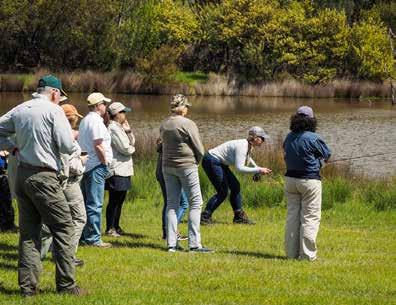
ABOVE Kristina would love to see more people, especially women and children, learning how to fly fish.
OPPOSITE TOP Success as an angler depends on people’s knowledge and understanding of the food source.
OPPOSITE BOTTOM
As a professional trout fishing guide, Kristina gets such a buzz out of seeing her clients land a trout.

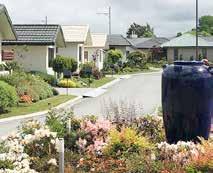
Modern Lifestyle Living
33 Connolly Street, Geraldine P 0800 845 524 or 03 693 8340 E sales@mlv.org.nz










